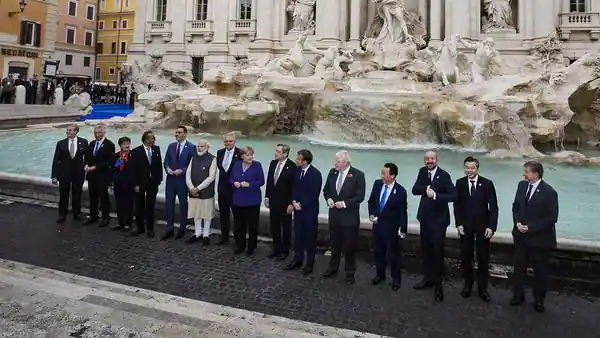ROME—Leaders of the Group of 20 major economies agreed to accelerate plans to tackle climate change but failed to nail down ambitious targets to curb emissions during a meeting Sunday, foreshadowing difficult negotiations at the United Nations-sponsored climate summit over the next two weeks.
During a two-day meeting in Rome, the G-20 nations, which include the U.S., India and China, struggled to find consensus on how best to adhere to the 2015 Paris climate agreement, which asks countries to start reducing their emissions as soon as possible and achieve a climate-neutral world by midcentury. G-20 economies account for around 75% of global emissions. Their summit in Rome comes ahead of U.N. climate talks known as COP26 in Glasgow, Scotland, that begin Sunday evening.
The leaders reaffirmed their commitment to the 2015 Paris agreement on climate change, which aims to “limit global warming to well below 2, preferably to 1.5 degrees Celsius” compared with preindustrial levels, according to a copy of the leaders’ final joint communiqué.
Diplomats agreed on a final text stating that the 1.5 degrees target should be kept “within reach” and that nations would commit to taking further action on climate change this decade, according to the communiqué. However, the final communiqué didn’t include many measures to achieve this target.
The G-20 includes some of the world’s biggest polluters and fossil-fuel producers, and countries with disparate levels of economic development, making forging consensus difficult. The final communiqué included no new commitments to phase out coal use domestically or fossil-fuel subsidies.
However, G-20 leaders agreed to halt public financing of coal power plants built overseas. The G-20 nations also for the first time pledged “to reduce G-20 methane emissions significantly,” the communiqué said.
“The fight against climate change is the defining challenge of our times,” Italy’s Prime Minister Mario Draghi, who is chairing the G-20 meeting in Rome, said Sunday as he rallied fellow leaders to act.
China’s President Xi Jinping said on Sunday in his second video address to the G-20 that developed countries should fulfill their promise to provide climate finance to developing countries.
In a veiled criticism of Western countries, Mr. Xi used his first address on Saturday to emphasize the importance of actions matching words on issues such as climate, Covid-19 vaccines and trade. “Credibility is the foundation for interactions with the world,” he said.
British Prime Minister Boris Johnson, whose government is hosting the COP26 summit, said on Saturday that it currently looked unlikely that the 1.5 degrees Celsius target would be met. U.N. climate experts say that global warming needs to be capped at that level to avoid major environmental catastrophe.
Current national climate plans, however, “still condemn the world to a calamitous 2.7-degree increase,” U.N. Secretary-General António Guterres told reporters on Friday. Mr. Guterres has previously called carbon neutrality by 2050 “the world’s most urgent mission.”
China, the world’s largest emitter of greenhouse gases, is aiming for net-zero emissions in 2060. India and Russia have also not committed to the midcentury deadline. The final G-20 communiqué said the group’s members would strive to achieve carbon neutrality “by or around mid century.” A previous draft version of the communiqué had set the deadline at 2050.
Stoking tensions among the G-20, rich nations have so far failed to meet a pledge to grant $100 billion a year to developing countries to help finance their shift away from fossil fuels and mitigate the effects of climate change. Currently, that $100 billion target will only be met in 2023, rather than by 2020 as pledged, the U.K. authorities that are hosting COP26 said recently. G-20 leaders said they would hit this goal as soon as possible, according to the communiqué.
Diplomacy in Rome has been hindered by the fact that not all world leaders are personally present at the summit. Mr. Xi, who has not left his country for 21 months, has participated at the G-20 via video link. Russian President Vladimir Putin also isn’t in attendance.
Apart from the issue of climate, the G-20 has been a largely conciliatory affair, with leaders trying to put geopolitical disputes aside as their economies emerge from the Covid-19 pandemic.
On Saturday, leaders backed the goal of vaccinating at least 40% of the world population against Covid-19 by the end of 2021 and at least 70% by the end of 2022. Currently, about 38.5% of the world’s population is fully vaccinated, according to Our World In Data.
Meanwhile, the U.S. and the European Union reached a deal to ease U.S. tariffs on steel and aluminum imports that were imposed under the Trump administration. G-20 leaders also gave their seal of approval to an agreement to set a minimum global corporate tax rate.
Separately, Secretary of State Antony Blinken met with his Chinese counterpart Wang Yi on Sunday morning amid tensions on issues such as Taiwan, human rights and trade.
A senior State Department official described the hourlong meeting as “constructive, productive and exceptionally candid.” The two sides discussed contentious issues such as Taiwan but also areas of possible cooperation such as Afghanistan, the Iran nuclear deal and climate change, and agreed to keep open communication lines at senior levels to manage the two countries’ competitive and contentious relationship.
The meeting also served as preparation for a coming virtual summit between President Biden and Mr. Xi later this year, the official said.
It was the first face-to-face session between Messrs. Blinken and Wang since their acrimonious meeting in Alaska in March. This time, video footage from Chinese media showed the two men touching each other’s shoulders as they bid farewell.
Last Tuesday, Mr. Blinken called Taiwan “a democratic success story” and said the self-ruled island should be allowed greater involvement in U.N. agencies. On Sunday, Mr. Wang called Taiwan “the most sensitive issue” between China and the U.S. and urged Mr. Blinken to adhere to “the real One China policy” as opposed to a “fake One China Policy,” according to a readout provided by Chinese media.
President Biden also met early on Sunday with Turkish President Recep Tayyip Erdogan. In recent years, American-Turkish relations have cratered over clashing interests in the war in Syria, human-rights issues within Turkey, and Ankara’s purchases of Russian arms systems.
The U.S. last year applied sanctions on Turkey for buying the S-400 missile system, expelling Ankara from the advanced F-35 jet fighter program. Ankara has complained about a payment made before the expulsion, with Mr. Erdogan saying the U.S. has offered F-16 jet fighters to resolve the issue.
According to the White House, Mr. Biden on Sunday “reaffirmed our defense partnership and Turkey’s importance as a NATO ally, but noted U.S. concerns over Turkey’s possession of the Russian S-400 missile system.” He also stressed the importance of “strong democratic institutions, respect for human rights, and the rule of law for peace and prosperity.”




